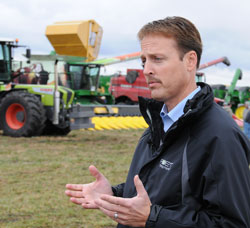 The National Ethanol Vehicle Coalition is pleased to add our congratulations to President Elect Obama on his victory in the 2008 Presidential election. As a non-partisan organization, we do not and did not support any political candidate from President down to the local County Commissioners. We are however, unapologetic advocates of the use of ethanol and other forms of renewable transportation fuels and look forward to working with President Elect Obama and his administration in advancing the use of renewable fuels.
The National Ethanol Vehicle Coalition is pleased to add our congratulations to President Elect Obama on his victory in the 2008 Presidential election. As a non-partisan organization, we do not and did not support any political candidate from President down to the local County Commissioners. We are however, unapologetic advocates of the use of ethanol and other forms of renewable transportation fuels and look forward to working with President Elect Obama and his administration in advancing the use of renewable fuels.
 After his inauguration on January 20, 2009, President Elect Obama will immediately be facing a myriad of critical issues. The recent “credit crunch”; 186,000 U.S. military service men and women engaged in two wars; the continued threat of international terrorism; and loss of jobs in the U.S. are but a few of the central concerns he will be dealing with……..and while the price of gasoline at our nation’s pumps is now some 50% less than the cost in July of this year, we are certain that the goal of domestic energy independence will remain in the top tier of his priorities.
After his inauguration on January 20, 2009, President Elect Obama will immediately be facing a myriad of critical issues. The recent “credit crunch”; 186,000 U.S. military service men and women engaged in two wars; the continued threat of international terrorism; and loss of jobs in the U.S. are but a few of the central concerns he will be dealing with……..and while the price of gasoline at our nation’s pumps is now some 50% less than the cost in July of this year, we are certain that the goal of domestic energy independence will remain in the top tier of his priorities.
President Elect Obama has been a strong supporter of the use of E85 as a form of renewable fuels. I first met then Senator Obama at the Grand Opening of a new E85 fueling facility in Springfield, Illinois, in June of 2004. At that time it was clear he possessed a tremendous knowledge of agriculture and renewable fuels and how renewable fuels could advance agricultural profitability and U.S. energy security. NEVC staff and contractors worked closely with Senator Obama and his staff to secure the federal income tax credit available to offset some of the costs of new fueling facilities. We have worked together to address matters relating to incentives that are provided to automakers to offset some of the costs of producing FFVs, and other matters of similar importance.
During the campaign, President Elect Obama frequently reiterated his support for biofuels, the massive production of flexible fuel vehicles, and the establishment of the infrastructure necessary to fuel new and existing FFVs.
On behalf of the National Ethanol Vehicle Coalition, we look forward to working with the president elect and his team to continue to advance the use of renewable fuels, break the nation’s addiction to oil, and promote rural economic development.


 In a statement, the
In a statement, the  “The organization will be dedicated to promoting clean, green ethanol as America’s best renewable fuel that is high-tech and homegrown, reducing greenhouse gas emissions and the nation’s dependence on foreign oil,” said POET CEO Jeff Broin.
“The organization will be dedicated to promoting clean, green ethanol as America’s best renewable fuel that is high-tech and homegrown, reducing greenhouse gas emissions and the nation’s dependence on foreign oil,” said POET CEO Jeff Broin.  Florida-based Green Flight International and Pennsylvania’s Lake Erie Biofuels have teamed up to complete the first non-stop, transcontinental flight in a jet powered predominantly by biodiesel.
Florida-based Green Flight International and Pennsylvania’s Lake Erie Biofuels have teamed up to complete the first non-stop, transcontinental flight in a jet powered predominantly by biodiesel. “These flights prove that we have the capability of supplementing our energy requirements with safe, environmentally-friendly alternatives to petroleum,” said Rodante. “And the biofuel is produced in the U.S., which essentially negates our dependency on foreign fuel supplies.”
“These flights prove that we have the capability of supplementing our energy requirements with safe, environmentally-friendly alternatives to petroleum,” said Rodante. “And the biofuel is produced in the U.S., which essentially negates our dependency on foreign fuel supplies.” Our friends at the Farm Foundation are at it again, bringing a variety of folks together to offer differing viewpoints to come up with workable solutions. Last month, I had a chance to sit in on their Transition to a Bioeconomy: Environmental and Rural Impacts Conference in St. Louis where I heard many sides of the issues facing the biodiesel and ethanol industries.
Our friends at the Farm Foundation are at it again, bringing a variety of folks together to offer differing viewpoints to come up with workable solutions. Last month, I had a chance to sit in on their Transition to a Bioeconomy: Environmental and Rural Impacts Conference in St. Louis where I heard many sides of the issues facing the biodiesel and ethanol industries.

